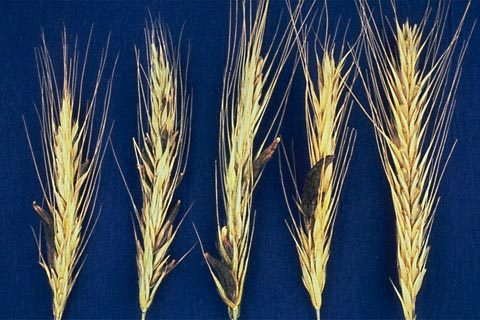BY JESSE HASKINS • AGRICULTURE LAW

Photo: American Phytopathological Society, Rye infected with ergot
In 6th century B.C.E., the Assyrians, in modern day Iraq, poisoned enemy wells with rye ergot, a fungus disease. Imagine seeing a person suffering ergotism. The first victim of bioterrorism in recorded history may have felt a violent burning. “Holy fire” became the nickname of the condition several centuries later. A person could lose their ability speak, become manic, suffer hallucinations, and find parts of their body peeling off.
In 1994, a religious cult in Oregon contaminated ten restaurant salad bars in an attempt to influence the results of a local election.
When the United States and its allies defeated Al Queda in the caves of Afghanistan in 2002, they discovered U.S. agricultural documents and terrorist manuals on how to target agriculture.
For decades, several sovereign countries have recognized that terrorists may target our food supply. On May 18, 2002, the World Health Organization passed a resolution recognizing as a potential target of terrorist attack our “food and water supply chains.” An attack on our food would be a direct attack on the “integrity of public health systems.”
We become especially vulnerable to food terrorism with monoculture and industrial scale farming. The United States Department of Homeland Security ran a war game called Silent Prairie. Journalist Brian Halweil explains how industrial farming may be an appealing target to terrorists:
When the simulation was over, the military and agriculture officials running it concluded that the American food system, perhaps the most technologically advanced and most competitive on the planet, was like a proverbial sitting duck. The miles and miles of cornfields planted in a single variety or the massive herds of genetically identical livestock are particularly vulnerable to any disease that is accidentally or maliciously introduced. The long-distance hauling of food also creates endless opportunities for contamination and spread …
After 45 days, 20 million animals had been destroyed. Losses totaled in the tens of billions of dollars, and public panic was leading to calls for martial law.
The armed forces were called in to police borders. People in different towns were shooting each other because state governors ordered that anyone crossing state lines should be shot on sight. In the late stages of the exercise, the participants discovered they couldn’t feed people in affected areas because of quarantines.
As Health and Human Services secretary Tommy Thompson said upon his 2004 departure, “For the life of me, I cannot understand why the terrorists have not attacked our food supply, because it is so easy to do.” Terrorism has historically been fought with decentralizing key infrastructure. I learned this when I studied in Belfast. When the Belfast bus system became the target of repeated bomb scares and violent attacks, transportation became more decentralized. Black taxis or “people’s taxis” emerged. No longer could terrorists target large population hubs in transportation. Empircal analysis of transnational terrorism over a quarter of a century confirms that “fiscal decentralization robustly decreases terror.” Local targets do not attract national attention, and therefore fly under terrorists’ radar. Attacks on several local organizations would require a high degree of coordination to cause a major disruption. For example, our electoral system is especially difficult to hack because each state has its own voting system.
The answer to food terrorism is similar. Decentralized, community-based food systems with heirloom crops best protect us from terrorism. Biodiversity protects us from terrorism. Several different crops are less likely to be vulnerable to the same biological threat. And when food systems are localized and self-contained, the source of an attack and its victims are easier to identify and to assist.
Jesse Haskins serves as vice president for Ecology Florida, and maintains a law practice emphasizing small scale agriculture. Prior to dedicating his practice to local agriculture, Jesse served as assistant attorney general for the State of Florida, assistant general counsel for the Florida Department of Financial Services, and as attorney for a large insurance defense firm.
Website: www.jhaskinslaw.com

